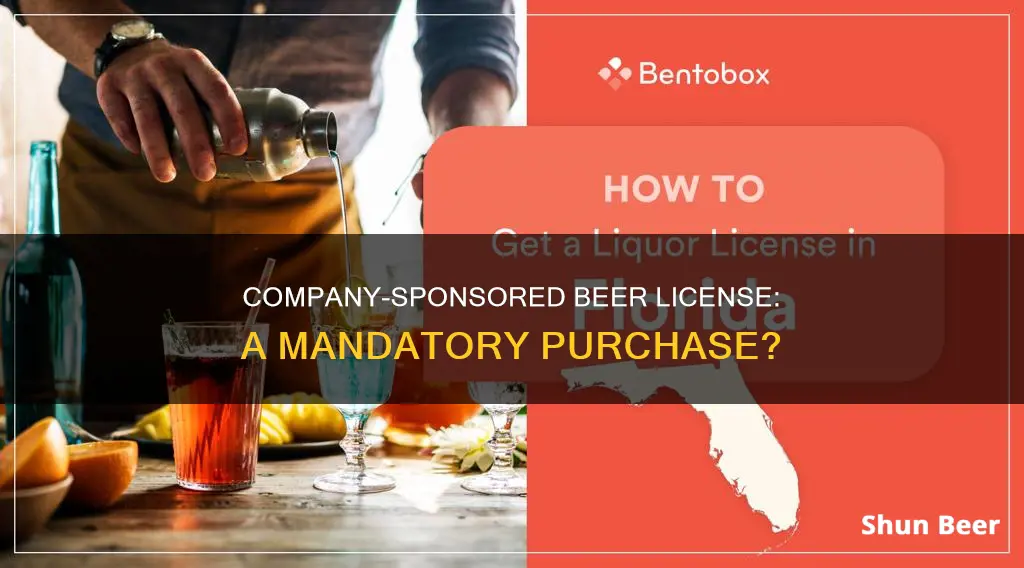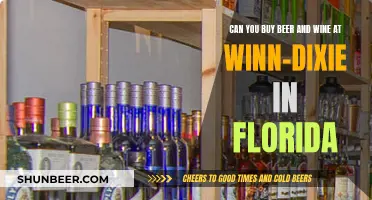
The short answer is yes, a company can require you to buy your own beer license. The laws surrounding alcohol sales are complex and vary by state, but in general, any business selling alcoholic beverages must have the proper liquor licensing in place. The primary purpose of liquor licenses is to regulate and control the sale of alcohol to promote responsible business practices and compliance with the law. Without the correct license, selling beverages like beer can result in steep fines or even criminal charges.
The type of license you need depends on the type of business and alcohol you want to sell. For example, a tavern license is required if alcohol sales are your primary source of business, whereas a beer and wine license will suffice if you only want to sell alcohol to complement food. The cost of a liquor license can range from $50 to $450,000, and you will also need to renew your license every one to three years.
What You'll Learn

On-sale vs off-sale licenses
On-sale and off-sale liquor licenses are two of the most common types of liquor licenses. The type of license a business requires depends on the nature of its operations.
On-sale licenses allow businesses to sell alcoholic drinks for consumption on the licensed premises, such as at restaurants, bars, hotels, and taverns. These licenses are typically used by businesses that serve alcohol alongside food services. There are two main groups of on-sale retail licenses: beer and wine (Type 41 and Type 42) and full on-sale general liquor (Type 47 and Type 48). Type 41 and Type 47 licenses are typically used by full-service restaurants that offer food services alongside alcohol sales. For these licenses, the business must have a kitchen, and all age groups are allowed on the premises. Type 42 and Type 48 licenses, on the other hand, do not require food service and are commonly used for bars or taverns where only individuals aged 21 and above are allowed.
Off-sale licenses, on the other hand, allow retail stores to sell prepackaged beer, wine, and liquor for consumption off-site. This type of license is typically held by liquor stores, grocery stores, convenience stores, and gas stations. There are two main types of off-sale retail liquor licenses: Type 20 and Type 21. A Type 20 license only permits the sale of beer and wine, while a Type 21 license allows for the sale of beer, wine, and spirits.
The cost of obtaining a liquor license varies depending on the type of license and the location of the business. In general, on-sale licenses tend to be more expensive than off-sale licenses, and licenses that permit the sale of a full range of liquors, wines, and beers are more costly than those that only allow for the sale of beer and wine.
Boston's Best Beer: Where to Buy Your Brews
You may want to see also

License costs
The cost of a beer license varies depending on the type of license and the location of the business. In the United States, licenses are typically issued by state or local licensing boards, and the fees can range from $100 to over $3,000. For example, in Delaware, license costs range from $150 to over $3,000, while in California, they can range from $3,000 to $400,000.
There are several types of licenses available, each with its own set of requirements and fees. The most common types of licenses include:
- On-sale licenses: These licenses allow businesses such as restaurants, bars, clubs, and theaters to sell alcoholic beverages for consumption on the premises. On-sale licenses are often in high demand and tend to be more expensive.
- Off-sale licenses: These licenses enable retail stores, including liquor stores, wine stores, and convenience stores, to sell alcoholic beverages in sealed containers for off-site consumption. Off-sale licenses generally have lower fees than on-sale licenses.
- Manufacturing licenses: These licenses are required for businesses that produce alcoholic beverages, such as breweries, wineries, and distilleries.
- Wholesale licenses: These licenses are needed for businesses that sell alcohol to licensed retailers, such as beer and wine wholesalers.
- Beer and wine licenses: This type of license permits the sale of beer and wine only, and they are typically less expensive than full liquor licenses.
It's important to note that the cost of a license also depends on market value, locality, and competition. In some states, there may be a limited number of licenses available, which can drive up prices. Additionally, there may be other costs associated with obtaining a license, such as zoning application fees, transfer fees, and escrow costs.
When applying for a beer license, it's crucial to consult the relevant regulatory bodies and seek legal advice to ensure compliance with all requirements and avoid delays or penalties.
Idaho Beer Laws: When Can You Buy?
You may want to see also

Application process
The application process for a beer license can be complex and lengthy, so it is important to be well-prepared. Here is a step-by-step guide to help you through the process:
Step 1: Determine Your License Type
The first step is to identify the type of license that best suits your business needs. The type of license you require will depend on the type of alcohol you intend to sell and whether your customers will consume it on-site or off-site. Common types of licenses include:
- Retail Liquor License: This license allows the sale of all alcoholic beverages, including spirits, beer, and wine, for off-site consumption.
- On-Premises Liquor License: This license permits the sale of alcoholic drinks for consumption on the premises, such as bars and restaurants.
- Beer and Wine License: This license is specific to the sale of beer and wine and may include on-site and off-site consumption.
- Brewpub License: A license that enables breweries to sell their beer directly to consumers on-site, often with limited food service.
- Distillery License: For the production, storage, and sale of distilled spirits.
- Winery License: This license allows wineries to produce, store, and sell wine, including on-site tastings and direct sales.
- Special Event Permit: A temporary permit for serving alcohol at events like festivals or weddings.
Step 2: Calculate License Cost
The cost of a beer license varies significantly depending on your location and the type of license. For example, in Delaware, fees range from $150 to over $3,000. It is important to consider not only the application fee but also the ongoing annual renewal costs.
Step 3: Consider Premises Requirements
In addition to financial requirements, there are often non-financial conditions that must be met. These requirements are set by your state or local alcohol regulatory body and typically include compliance with zoning laws, cleanliness standards, and structural requirements. If serving alcohol on-site, you may also need to meet additional requirements, such as providing adequate restrooms and adhering to seating capacity restrictions.
Step 4: Submit Your Application
Submitting your application involves several steps, including:
- Completing the initial application filing
- Notifying the governing body of your application
- Complying with the regulatory body's investigation
- Undergoing a final review
- Receiving your license
There may also be additional prerequisites, such as posting public notices or obtaining zoning permits, depending on your jurisdiction.
Step 5: Regularly Renew Your License
Maintaining your beer license requires periodic renewals, typically involving updated information about ownership, location, and other relevant details. Staying on top of renewals is crucial to avoid disruptions to your business operations. Providing inaccurate information during the renewal process can lead to complications or even revocation of your license.
Best Places to Buy Friday Beers
You may want to see also

License renewal
It is important to renew your license periodically as mandated by your state or locality. License renewals usually involve submitting a renewal application within a specified timeframe before the expiration date. It is crucial to adhere to the appropriate timelines for your state to avoid disrupting your store's licensing, which could be detrimental to your operations and profits.
Renewal applications often require updated information, including any changes in ownership, location, or other pertinent details. Providing inaccurate or false information during the renewal process can lead to complications or the potential revocation of your license. It is also important to note that you will not be able to submit renewals beyond a certain period after the license expiration date, after which an original (new) application and fees must be submitted. For example, in Texas, businesses can renew up to 30 days after the expiration date by paying a late fee, but they must stop licensed activities after the expiration date unless a renewal application with fees is pending.
In New York, you will receive a renewal advisory approximately three months before your license expires. The renewal advisory will include the total fees due for renewal. A renewal application must be filed before the expiration of the current license period, and it is recommended to allow 10 business days for processing. If you have an on-premises beer, wine, or liquor license in one of the five boroughs of New York City, you must notify your Community Board of your intent to renew your license at least 30 days before filing your renewal application.
Additionally, it is important to be mindful of any local fees and taxes that may be required by your city or county, as these are separate from state fees. For instance, in Texas, businesses must pay a local fee for their TABC license or permit in addition to the state fee.
Indio Beer: Where to Buy and Try This Brew
You may want to see also

Risks of losing a license
Losing a liquor license can have serious repercussions for a business, and there are several ways this can happen. Here are some of the key risks associated with losing a liquor license:
- Financial Loss: A liquor license is often critical to the financial success of a restaurant or bar. Alcohol sales can contribute significantly to a business's profits, and losing the ability to sell alcohol could result in a substantial financial blow. This is especially true if the license revocation is accompanied by steep fines or legal costs.
- Reputational Damage: The loss of a liquor license can damage a restaurant's reputation, leading to negative media coverage and a decline in customers. It can be challenging for a business to recover from such negative publicity, and it may take significant time and effort to rebuild trust with patrons.
- Legal Consequences: In some cases, losing a liquor license may result in legal consequences beyond financial penalties. Criminal charges may be filed against the establishment or individuals responsible for violations, particularly if the violations are severe or repeated. This could lead to additional fines, jail time, or other legal sanctions.
- Business Closure: In extreme cases, losing a liquor license could lead to the permanent closure of a business. This is especially true if the license revocation is combined with other factors such as declining sales, negative publicity, or legal issues. The inability to sell alcohol can be a significant blow to a business's revenue stream, making it difficult to remain operational.
- Difficulty in Obtaining Future Licenses: Once a business has lost its liquor license, it may face obstacles in obtaining a new license or having the old one reinstated. The business may need to undergo additional inspections, pay higher fees, or meet stricter requirements to regain the privilege of selling alcohol.
- Loss of Competitive Advantage: In the highly competitive hospitality industry, the ability to sell alcohol can be a significant differentiator. Losing a liquor license could put a business at a disadvantage compared to its competitors, potentially resulting in a loss of market share and a decline in overall profitability.
To avoid these risks, it is crucial for businesses to comply with all applicable laws and regulations regarding the sale and service of alcohol. This includes regular staff training, implementing effective ID verification systems, and maintaining proper documentation. By taking proactive measures, businesses can minimize the chances of losing their liquor license and protect their operations, reputation, and financial stability.
Trillium Beer: Where to Buy and What to Know
You may want to see also
Frequently asked questions
Yes, with few exceptions, any business selling alcoholic beverages like beer must have the proper liquor licensing in place. The laws are confusing, and the consequences steep: get it wrong and you risk liquor license violations, confiscated inventory, and severe fines.
There are two different types of licenses you can obtain in order to sell alcohol – on-license and off-license. On-licenses are for places that intend to sell alcohol to be consumed within the location, while off-licenses are required for locations selling alcohol to be consumed off-premises, such as liquor stores.
The cost of a liquor license varies depending on the state and type of license. The cost can range from $50 to $450,000.







